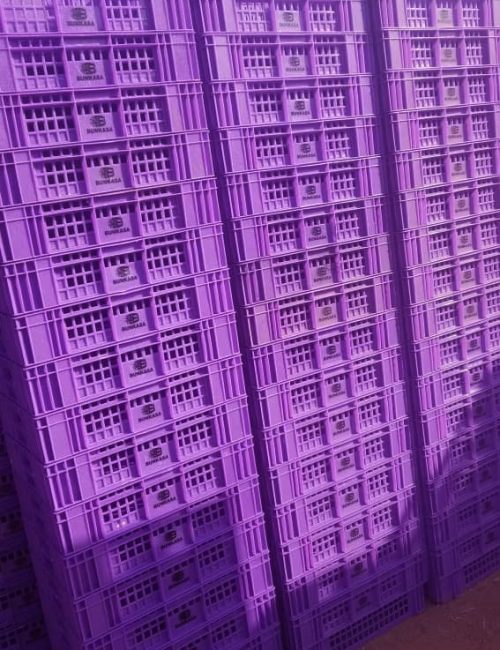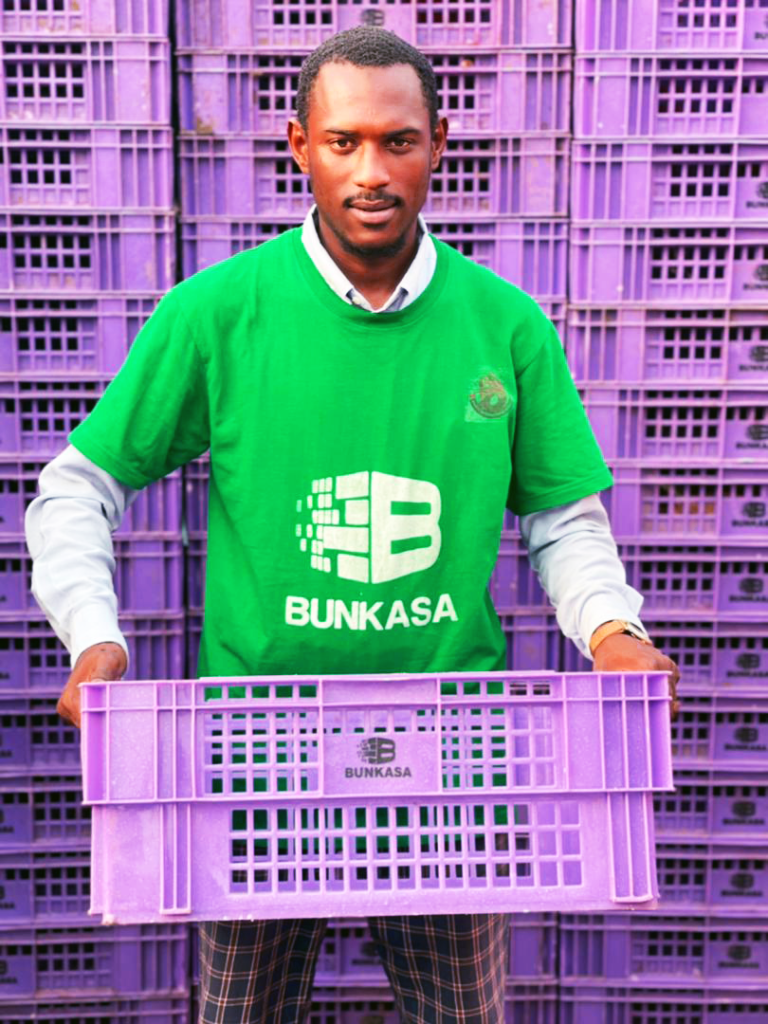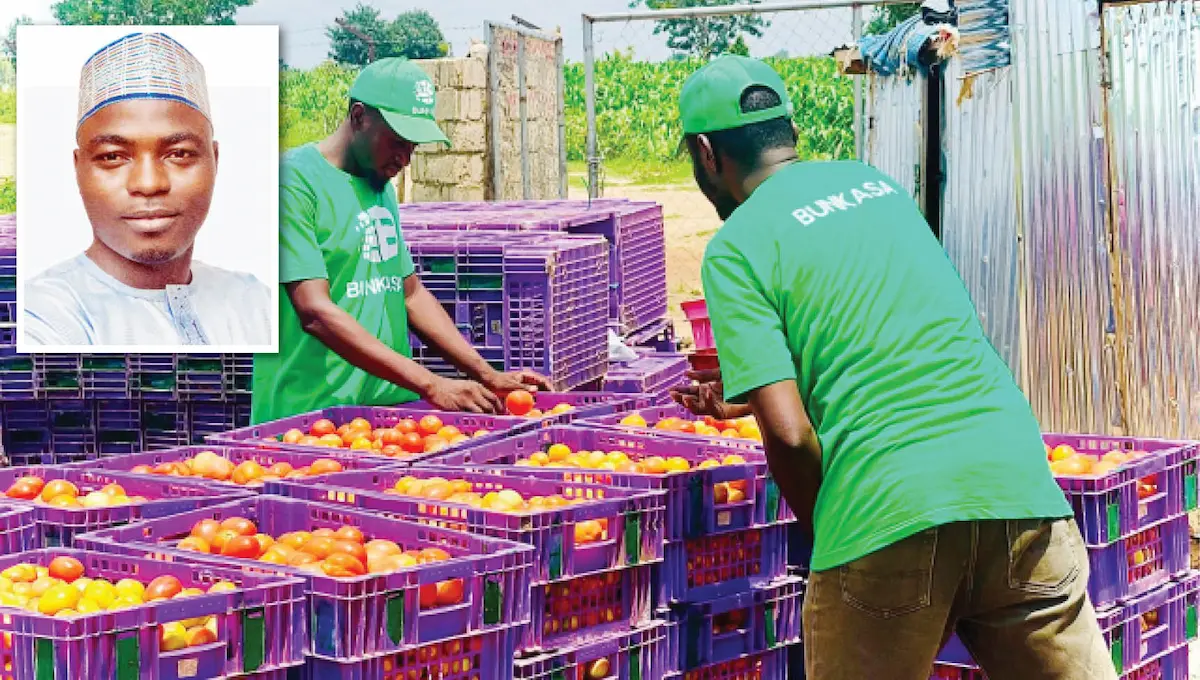Muhammad Yakubu Bubayaro is an agric-tech expert and advocate of the use of new technology by farmers. Daily Trust reports how the 29-year-old, through his firm, Bunkasa Agri-tech, is remodelling the agricultural value chain through the introduction of returnable plastic crates to replace raffia in the transportation and preservation of vegetables. Bubayaro argues that this will serve as a panacea to post-harvest loss by farmers in the country and also ensure that vegetables are safe for consumption.
Muhammad Yakubu Bubayaro was raised around Mile 12 International Market; a Lagos market reputed for the sale of fresh farm produce across Africa.
While growing up, Bubayaro became familiar with the pains of farmers whose perishable farm produce sometimes ended a waste while conveying them from the northern part of the country to the south. He vowed to impact the lives of farmers by ensuring they get rewarded for their labour, improving investment in the fresh produce value chain and ensuring consumers get fresh and safe vegetables for consumption.
With the requisite knowledge and skills in agriculture and technology, the agric-tech expert, who now works as the Director of Media and Information Technology at the Mile 12 International Market, launched the Bunkasa Agric-tech; an agriculturally focused initiative to redefine how perishable farm produce is packaged and transported from farms in the north to the southern part of the country.
With this initiative, Bubayaro focused on redefining and encouraging farmers to key into what he described as a “remodeled way of packaging and transporting fresh farm produce with ease.”
“We underscore the importance of the adoption and use of plastic crates as a substitute for raffia baskets, which is the surest way of preserving the commodity to the final consumers,” the agric-tech expert said, explaining that the use of raffia baskets in conveying fresh farm produce needed to be discouraged.


Bubayaro, who hails from Karaye in Kano State, and is an alumnus of the prestigious Barewa College, Kaduna and British Charted Institute of Information Technology (BCS), believes that Bunkasa Agri-tech will help close the gap by equipping farmers with the right technologies, new seedlings and promoting the use of plastic crates in fresh produce storage and transportation, to drastically minimise post-harvest loss.
He said the use of technologically-improved seedlings, which are sold to farmers at affordable prices, has kicked off in the north-western states of Kano and Kaduna, with plans to extend the initiative to Ogun and Oyo states in the south-west.
He attaches great importance to the use of plastic crates as substitutes for raffia baskets because he argues, plastic crates help retain the freshness of the commodity as well as prevent it from shrinking.
He added that by adopting the new technology, the fresh produce will remain hygienic, safe and attractive to consumers. “And in the crates, farmers are able to sort out those that are ripe, unripe and the rotten ones in different places for quick marketing,” he said.
“In the case of raffia baskets, they are all in one place. This situation often discourages foreign buyers who come to the market daily from various African countries. These types of buyers also go for the best produce as they don’t compromise standards,” he explained.
Daily Trust gathered that the Bunkasa website provides periodic information on changes in prices of agricultural commodities and other vital information that is accessible to farmers and consumers.
Apart from the plastic crates, Bunkasa has also introduced an organic-based fertiliser for tomatoes, vegetables and herbs made from eggshells.
But like any innovation, the adoption of Bubayaro’s modern technology by farmers has not been fully embraced. He explained that this could be due to a lack of awareness or sensitization of its efficacy in making their farm produce last longer. “For us at Bunkasa Agri-tech, we are doing everything to make farmers maximise their profit,” he assured.
He said even though the Nigerian government and other agricultural partners insist on the use of cold chains and cold rooms as the only means of preservation of perishable goods, experts have observed that it is only when the fresh produce is transported safely to the market that farmers would now think of storing them in cold rooms.
“Storage is a necessity because every farmer would like to sell out the product upon delivery and store the remaining ones for a few days. So, the issue of storage should be the last and unavoidable option for farmers who transport their goods all the way from the north to the south,” he said.
But there is light at the end of the tunnel as Daily Trust gathered that Bubayaro’s returnable plastic crates have been sighted in Jos, Kaduna and other parts of the country.
He says farmers are gradually accepting the use of the crates, with demand for them now outweighing supply.
With a vision to improve the dietary health of consumers, Bubayaro explained that when completely adopted, the innovation will help consumers avoid the risk of exposure to bacterial poisoning from the consumption of rotten produce.
The agri-tech expert, however, expressed displeasure at the lack of support from the government and other agricultural firms to help shift the narrative from the traditional usage of raffia in conveying fresh produce to the market.
He said in the course of expanding the scope of the technology, his firm had approached banks for loans but was discouraged by the “exorbitant and high-interest rates.”
Showing satisfaction with the inroads his technology is making in parts of the country, Bubayaro said now is the time to embrace the use of returnable plastic crates as most of the state governments in the south are contemplating banning the transportation of fresh goods in raffia baskets, as it violates their sanitary laws.





